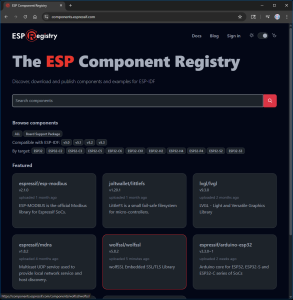We’re excited to announce that wolfSSL v5.8.2 is now officially released and available through The ESP Component Registry!
wolfSSL is a lightweight, high-performance TLS/SSL library optimized for embedded systems. It is widely used in IoT, automotive, aerospace, and other resource-constrained environments.
What’s New in v5.8.2:
- Security Enhancements: Multiple updates for improved cryptographic robustness and protocol handling.
- Expanded Hardware Acceleration Support: Optimizations for ESP32 and ESP32-C3/C6/S3 targets, making the most of Espressif’s hardware crypto engines.
- Improved Certificate Handling: More flexible certificate loading and verification, including enhancements for embedded CA chains.
- Bug Fixes and Stability Improvements: Various fixes across TLS 1.2 and TLS 1.3 implementations to ensure smoother and more reliable secure connections.
- ESP-IDF Compatibility: Verified support for ESP-IDF v5.x, ensuring seamless integration with the latest Espressif SDKs.
Check out the wolfSSL release notes!
Why Use wolfSSL on ESP32?
- Minimal footprint with aggressive size optimizations.
- Full support for TLS 1.3 and TLS 1.2.
- Hardware crypto acceleration using Espressif APIs.
- FIPS-ready and MISRA-compliant options available for safety-critical applications.
Integration Highlights
- Register and include the component in your
idf_component.yml: dependencies: wolfssl/wolfssl: version: "5.8.2" - Or install via the command line:
idf.py add-dependency "wolfssl/wolfssl@5.8.2"
Get Started With Examples
To help you get started quickly, the wolfSSL v5.8.2 component includes a rich set of fully integrated ESP-IDF examples, covering a variety of use cases and configurations.
- setup the ESP-IDF environment.
- fetch the wolfSSL benchmark example.
- change directory to the downloaded project.
- compile, upload, and view output.
Like this:
. ~/esp/esp-idf/export.sh idf.py create-project-from-example "wolfssl/wolfssl^5.8.2:wolfssl_test" cd wolfssl_test idf.py -b 115200 flash monitor
These examples are ideal for developers new to wolfSSL, as well as those looking to evaluate specific TLS features or test hardware acceleration support on Espressif chips.
- template A minimally viable wolfSSL setup, perfect as a starting point for your own project. This clean and simple example helps you integrate wolfSSL with minimal configuration.
- wolfssl_benchmark – Runs the wolfcrypt benchmark application on your ESP32 target. Ideal for measuring the performance of cryptographic operations across different chips and configurations.
- wolfssl_client – A TLS client demo that connects to a secure server (e.g., CLI server or Espressif TLS server). Demonstrates how to initialize, configure, and run a secure client using wolfSSL.
- wolfssl_server – A TLS server counterpart to the client example. This demo creates a secure endpoint on the ESP32 and shows how to handle TLS handshakes and encrypted communications.
- wolfssl_test – A port of the wolfcrypt test application for ESP32. Use this to verify the build and runtime functionality of various wolfSSL cryptographic components in your environment.
New to wolfSSL on the Espressif family of devices?
If you are new to wolfSSL on the Espressif ESP32, this video can help to get started:
Additional Details
To check which version of the Component Manager is currently available, use the command:
python -m idf_component_manager -h
The Component Manager should have been installed during the installation of the ESP-IDF. If your version of ESP-IDF doesn’t come with the IDF Component Manager, you can install it:
python -m pip install --upgrade idf-component-manager
For further details on the Espressif Component Manager, see the GitHub idf-component-manager repo.
Have a specific request or questions? We’d love to hear from you. Please contact us at support@wolfssl.com or open an issue on GitHub.
If you have questions about any of the above, please contact us at facts@wolfSSL.com or call us at +1 425 245 8247.
Download wolfSSL Now


